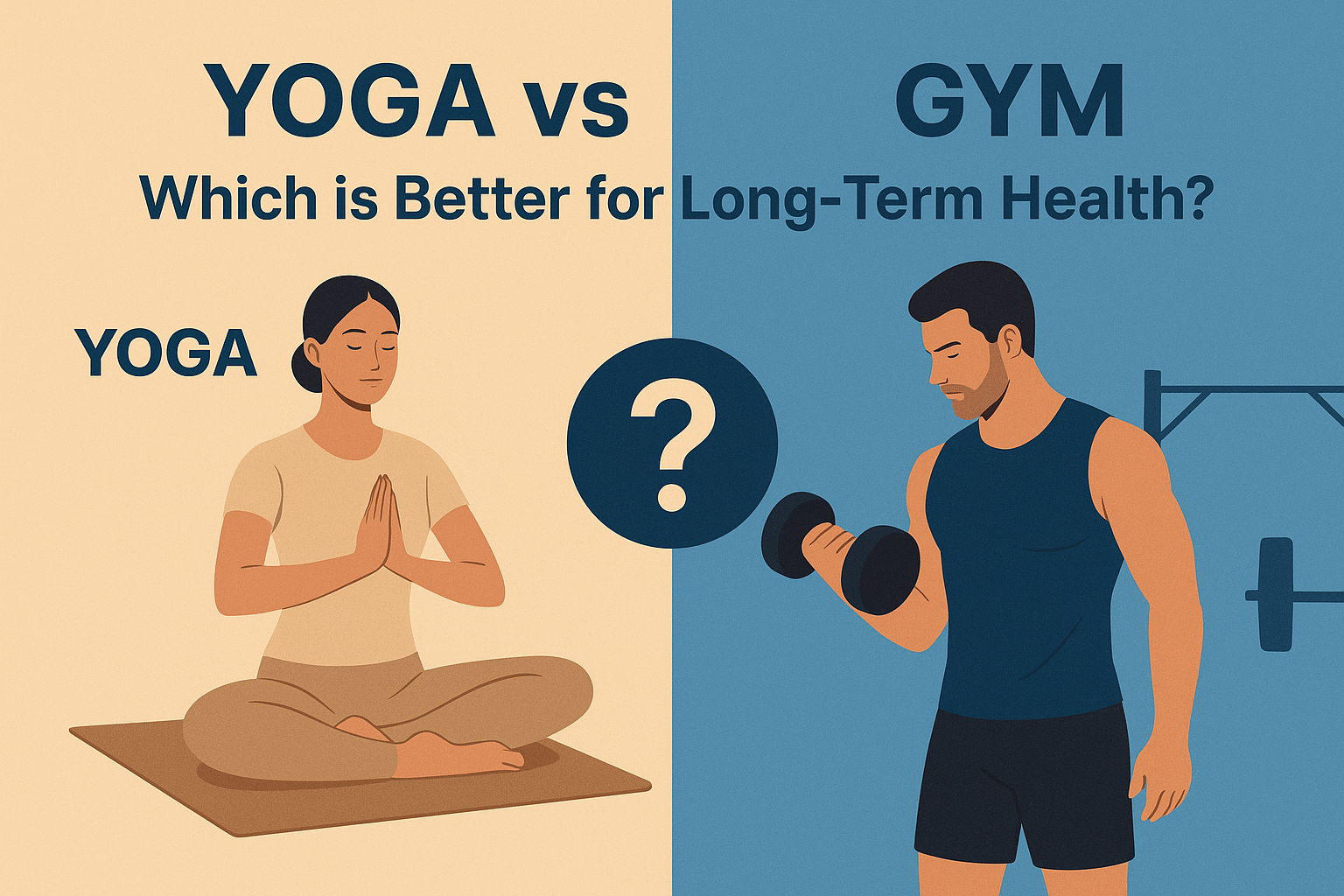In today’s fast-paced world, staying healthy is not just an option – it’s a necessity. With rising stress, long working hours, and unhealthy lifestyle habits, more people are turning towards fitness solutions. Two of the most popular approaches to maintaining health and fitness are Yoga and Gym workouts. But the question remains: Which is better for long-term health—Yoga or the Gym?
Both have their unique benefits, principles, and outcomes. To answer this question, let’s explore them in detail, compare their long-term effects, and analyze which option may be more suitable for you.
What is Yoga?
Yoga is an ancient Indian practice that combines physical postures (asanas), breathing techniques (pranayama), and meditation to bring harmony between the body, mind, and soul. Unlike conventional exercise routines, yoga emphasizes inner awareness and holistic well-being rather than just physical fitness.
Some of the most popular forms of yoga include:
- Hatha Yoga – Focuses on physical postures and breathing.
- Vinyasa Yoga – Flow-based yoga that improves flexibility and stamina.
- Ashtanga Yoga – A physically demanding practice with structured poses.
- Kundalini Yoga – Focused on energy, meditation, and spirituality.
Yoga doesn’t require heavy equipment. All you need is a mat and comfortable clothing, making it a sustainable practice for life.
What is Gym Training?
Gym training refers to structured workouts using weight training machines, free weights, and cardio equipment to build strength, stamina, and overall fitness. The gym offers a wide range of activities such as weightlifting, resistance training, high-intensity interval training (HIIT), and cardio exercises like running, cycling, and rowing.
A gym environment is often results-oriented, aiming at:
- Muscle building
- Fat loss
- Strength training
- Athletic performance
- Endurance improvement
Unlike yoga, gyms usually require memberships, machines, and external motivation, especially for beginners.
Health Benefits of Yoga
Yoga is much more than just physical exercise. Its impact on long-term health is deeply rooted in mind-body balance.
1. Improves Flexibility and Joint Health
Regular yoga practice stretches muscles and joints, improving mobility and preventing stiffness. This is particularly beneficial for older adults who want to maintain healthy joints.
2. Reduces Stress and Anxiety
Yoga emphasizes mindfulness and deep breathing, activating the parasympathetic nervous system. This reduces stress hormones like cortisol, improving mental well-being.
3. Enhances Lung Capacity and Heart Health
Pranayama (breathing techniques) strengthens respiratory functions and improves oxygen circulation, which supports cardiovascular health.
4. Strengthens Core and Posture
Most yoga asanas engage the core, spine, and supporting muscles. This leads to improved posture and reduced risk of back problems.
5. Promotes Hormonal Balance
Yoga helps regulate hormones by reducing stress and enhancing endocrine functions, which plays a role in weight management and reproductive health.
6. Increases Longevity
Studies suggest yoga practitioners enjoy better immunity, reduced risk of chronic diseases, and improved overall life expectancy.
Health Benefits of Gym Training
Gym workouts are highly effective for physical transformation and strength-building.
1. Builds Muscle and Strength
Weight training stimulates muscle growth (hypertrophy), increasing strength and improving body composition.
2. Boosts Metabolism
Muscle burns more calories than fat. Building lean muscle mass in the gym boosts metabolism, helping with fat loss and long-term weight control.
3. Improves Heart Health
Cardio workouts like treadmill running, cycling, and rowing enhance cardiovascular endurance and reduce the risk of heart disease.
4. Enhances Bone Density
Resistance training strengthens bones, reducing the risk of osteoporosis and fractures, especially in older adults.
5. Supports Athletic Performance
For those pursuing sports, gym workouts improve agility, speed, and explosive power.
6. Increases Energy and Endurance
Consistent training boosts stamina, energy levels, and physical resilience.
Yoga vs Gym: A Detailed Comparison
| Factor | Yoga | Gym |
|---|---|---|
| Focus | Mind-body balance, flexibility, stress reduction | Strength, muscle building, endurance |
| Equipment | Minimal (mat, comfortable clothes) | Machines, weights, memberships |
| Mental Health | Excellent for stress relief, mindfulness, and relaxation | Moderate benefits, primarily stress release via endorphins |
| Physical Health | Improves flexibility, joint health, posture, hormonal balance | Builds muscle, improves bone density, boosts metabolism |
| Injury Risk | Low, but possible with wrong postures | Higher risk if improper form or overtraining |
| Longevity Impact | Promotes holistic health, disease prevention, and longevity | Improves physical strength and fitness, but may cause strain if not balanced |
| Sustainability | Can be practiced lifelong, at any age | May become difficult to sustain in older age |
| Cost | Affordable, can practice at home | Expensive (memberships, trainers, supplements) |
Long-Term Health Impact of Yoga
When it comes to long-term health, yoga shines because it is sustainable across all ages. Even senior citizens or people with health issues can practice yoga safely. Its focus on breathing and meditation ensures not just physical health but also mental and emotional stability.
Yoga is also proven to:
- Reduce risk of chronic diseases like diabetes, hypertension, and depression.
- Improve sleep quality.
- Enhance immune system functions.
- Maintain emotional resilience against stress.
For someone who wants a holistic lifestyle and disease-free long-term health, yoga provides unmatched benefits.
Long-Term Health Impact of Gym
The gym is highly effective for people aiming to build a strong, athletic body and maintain high physical performance. However, sustainability can be a challenge. Heavy workouts may strain joints, cause injuries, or lead to burnout if not managed properly.
That said, if done correctly and consistently, gym training ensures:
- Stronger bones and muscles.
- Lower body fat percentage.
- Better cardiovascular health.
- High stamina and endurance.
The downside is that many people quit gym routines due to lack of time, injuries, or loss of motivation.
Which is Better for Long-Term Health?
The answer depends on your goals, lifestyle, and preferences.
- If your aim is overall wellness, stress relief, mental peace, flexibility, and longevity, Yoga is better for long-term health.
- If your aim is muscle building, physical transformation, or athletic performance, Gym is better in the short and medium term, though it requires commitment and care for long-term safety.
However, the best solution may not be choosing one over the other, but rather combining Yoga and Gym.
The Perfect Balance: Yoga + Gym
Modern fitness experts suggest that a balanced combination of yoga and gym provides the most comprehensive benefits.
- Yoga after gym helps in muscle recovery, stretching, and relaxation.
- Gym with yoga improves strength and endurance while yoga keeps stress levels low.
- Together, they enhance strength, flexibility, and mindfulness, leading to long-term sustainable health.
For example, a weekly routine could look like this:
- 3 days of gym training (strength + cardio)
- 2 days of yoga (flexibility + meditation)
- 1 day active rest (walking, cycling, or light stretching)
Final Thoughts
The Yoga vs Gym debate is not about which one is superior, but about what aligns better with your lifestyle and health goals.
- Yoga ensures holistic health, stress management, and longevity.
- The Gym ensures strength, physique transformation, and endurance.
- A combination of both ensures the best of both worlds.
For long-term health, yoga holds a slight edge because it is sustainable at any age, improves mental health, and prevents lifestyle diseases. But if combined with gym training, you can create a complete fitness routine that keeps you physically strong, mentally peaceful, and emotionally balanced.
So, instead of asking “Yoga vs Gym: Which is better?” perhaps the right question is “How can I combine Yoga and Gym for the healthiest version of myself?”
✅ SEO Keywords to target: Yoga vs Gym, Yoga benefits, Gym workout benefits, Yoga for long-term health, Gym vs Yoga, Best exercise for longevity, Yoga and fitness, Mental health benefits of yoga, Gym training for strength.


